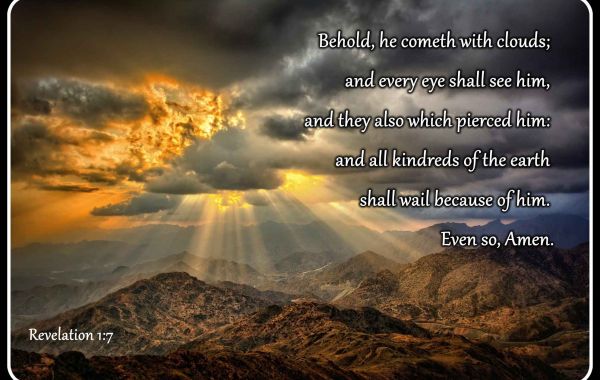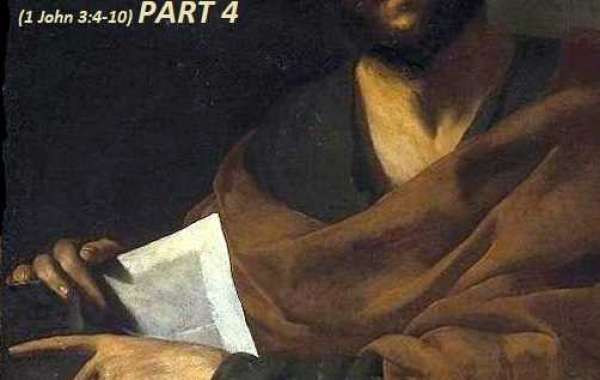The Epistle of Jesus #1: Behold The Coming King
Part 1 Greeting - Revelation 1:1-4
1 The Revelation of Jesus Christ, which God gave unto him, to shew unto his servants things which must shortly come to pass; and he sent and signified it by his angel unto his servant John: 2 Who bare record of the word of God, and of the testimony of Jesus Christ, and of all things that he saw.
In the very first verse, John writes, that this is, “the Revelation of Jesus Christ.” The word revelation is the Greek Word: ἀποκάλυψις, which is transliterated for us today as, apocalypse. It does not mean end of the world, cataclysm, or dooms day. It simply means the revealing or the unveiling. And so, John is saying that this epistle is the revealing of Jesus Christ. That is its first and primary purpose.
To really benefit from the Book of Revelation you need to understand and keep in the uppermost of your mind that purpose. The book of Revelation, the apocalypse, was not written to give us details of the future or help us name the anti-christ. (Hint: it wasn’t Donald Trump or Barack Obama. Nor was it one of the Roman Emperors or one of the popes, Mohammad or Hitler.) Revelation was not written so we could know the future, but it was written that we might know Him who holds the future. It was not written to know when the Lord is coming back but to know and rejoice in Him who is coming back.
It was written to give hope to those in John’s time suffering under the persecutions of the Jews, and the Roman emperors. It is also written for us when we go through persecution, pain and sorrow that we will know this is not the end, for Jesus is Lord and has the keys of death and hell. He will come and all pain and sorrow will be conquered. Finally, Revelation was especially written for those who will be caught in the Great Tribulation, those who put their faith in Jesus after the rapture, and specifically to the Old Covenant people of God, the believers of Israel, who will then recognize their coming Messiah, was truly the long rejected Jesus of Nazareth. This letter from Jesus to them will give hope and they will know that this time is not the end of the world but only the beginning of eternity.
John writes that the letter was “sent and signified by his angel (his messenger) unto his servant John” The word signified means “to show by a sign.” That’s important because John is saying, this vision is signified, proven with the things John saw, beginning with his vision of Jesus.
John as amanuensis for Jesus, Jesus’ epistle to the churches
I have entitled this series, The Epistle of Jesus, to focus on its purpose, to reveal Jesus the returning King. It was recorded by John in a sense writing as Jesus’ amanuensis, his scribe. In Revelation 1:11 Jesus commands, “What thou seest, write in a book, and send it unto the seven churches.” And the Jesus proceeds to supernaturally show in a vision, the Revelation you now hold in your hand. This is the only time Jesus told any of the New Testament writers to write. The Gospels, Acts, the Epistles and personal letters that make up the New Testament were inspired and supervised by the Holy Spirit but this book, this is the epistle of Jesus, given to John directly by the Lord.
John wrote while he was on the island of Patmos around 96 AD, which at that time was a Roman penal colony, a rocky, hot, volcanic island prison. It served the same purpose as Alcatraz or Devil’s island would centuries later. The members of the early church of Jesus had undergone persecution from the Jews in Palestine and anywhere the Sanhedrin had authority, then the church had to endure the persecution of the full power and authority of the Roman empire, under Nero, who blamed the new sect called Christians for the burring of Rome in 64 AD. Under Nero’s authority, both Peter and Paul were executed.
Now in 96 AD another emperor descended from the same family that had destroyed the Temple in Jerusalem, begins to persecute the people of God. Emperor Titus Flavius Caesar Domitianus Augustus; usually called Domitian. He deified himself and began referring to himself as Dominus et Deus (“Lord and God”). This of course put the followers of Jesus, those who would only name Jesus as Lord and God, in direct conflict with the emperor. The book of Revelation was written during this very dangerous and dark time.
It was dark for all the people of God but it was especially dark for the last apostle of Jesus, John. John now around 100 years old was the most important living person of the still young Christian faith. It was John who testified in his first epistle, 1 John 1:1-2, “That which was from the beginning, which we have heard, which we have seen with our eyes, which we have looked upon, and our hands have handled, of the Word of life; 2 (For the life was manifested, and we have seen it, and bear witness, and shew unto you that eternal life, which was with the Father, and was manifested unto us;)
To control the Christians, Domitian, needed to shut up John and so he was sent to the rocky island prison of Patmos, hopefully to die but definitely to be shut up. But oh, my what a different outcome came from that island of isolation. Instead of controlling the last apostle, Domitian, unleashed the coming eternal King, Jesus. Domitian wanted worship as deserving a god, but instead he was killed the same year John wrote this epistle. Domitian wanted others to believe he was eternal, instead his life was measured in just months and John from that island prison revealed the only true eternal one, Jesus God’s own Son.
Cerca
Post popolari








